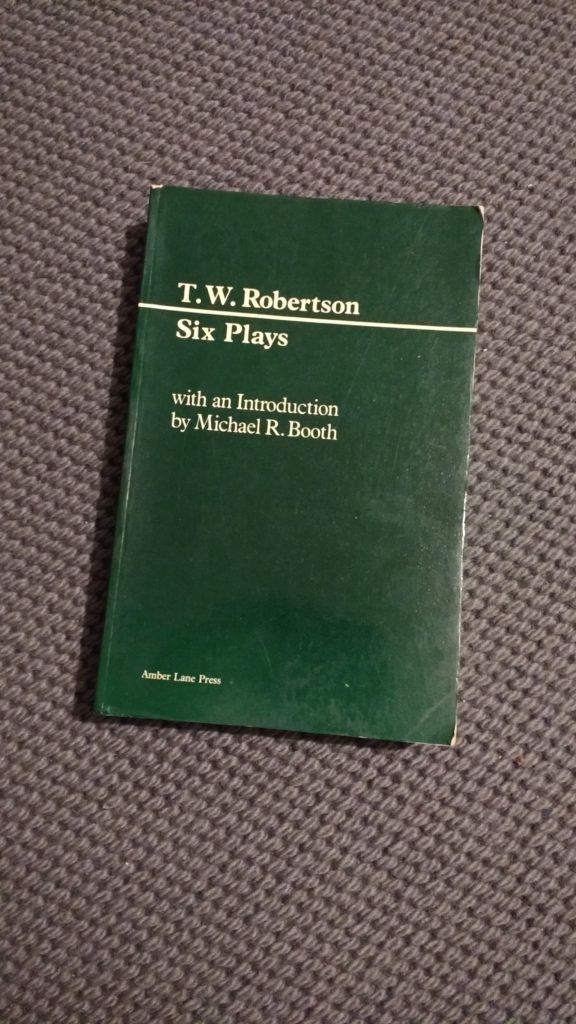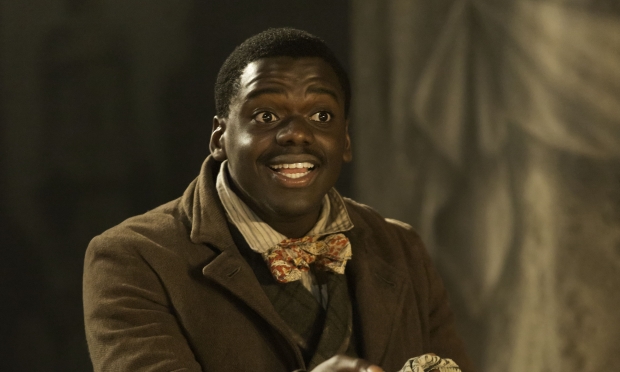What does reality look like on stage? I’ll tell you what it doesn’t usually look like: a play that sets the finale in ivy-covered ruins on an aristocratic estate. Or a plot of exemplary neatness in which two pairs of brothers and sisters each fall in love with their opposite (heterosexual) number and temporarily repair the rents in the Victorian class system.
I chose one of TW Robertson’s Victorian comedies for the 12 Plays of Xmas series because they are often cited in theatre history even if rarer than a manticore on the modern stage. You are most likely to encounter Robertson today in his fictionalised guise of Tom Wrench, the aspiring playwright in Pinero’s Trelawny of the ‘Wells’. Wrench is exasperated by the antiquated and artificial repertory: ‘I strive to make my people talk and behave like live people, don’t I,’ he says. ‘To fashion heroes out of actual, dull, everyday men – the sort of men you see smoking cheroots in the club windows in St James’s Street; and heroines from simple maidens in muslin frocks.’
Birth (1870) is certainly on nodding terms with its society. It pits aristocrat against industrialist – the youthful Earl of Eagleclyffe’s failing estate has been bought by the Hewitt family, who have established a works on the land and are about to seal the social change by buying the Eagleclyffes’ castle itself. Sarah Hewitt is as active in the successful family business as her brother, and unusually mechanically-minded for a stage heroine. She and the earl don’t flirt, exactly, but there is a frisson as she takes him through the workings of a new gun (‘Do you understand the theory of percussive power?’), boggling him by her familiarity with cartridge, barrel and ramrod.
On the other hand, she’s also retrograde-catty about the earl’s pretty sister, and squeezed into the double marriage plot in which aristocratic alliance somehow forgives the Hewitts for their economic success. The middle-class entrepreneur may be excused – the labouring classes are beyond the pale, a booze-driven thuggery always on the verge of becoming a lynch mob until quietened by an invitation to raid the earl’s cellar. If Birth registers some of its society’s currents, it refuses to extend sympathies toward others.
Birth was more interesting to read than, I suspect, it might be to see staged. If Robertson’s plays once had a tang of the new, now they also seem musty and acrid. Nicely, though, the comedy does include a would-be playwright who wants to reflect reality. Jack Randall is an odd outsider – the earl’s schoolfriend, Paul’s best chum, confiding with the ladies and hamming it up for the mob. He spends much of the play lurking beside the burgeoning romances and misunderstandings, scribbling down ideas in shorthand for his own comedy (or, possibly, tragedy, he isn’t sure). ‘I mean to write raw,’ he says, ‘from the life.’
Robertson’s raw isn’t quite ours. And ours, I suppose, may not seem real soon enough.
Sample stage direction ‘The double doors open and disclose Paul, and Lady Adeliza in a riding habit. Paul is without his hat, and is supporting her… Picture. Music piano till end of Act.’
Sample quote Sarah: ‘The ramrod is abolished, which is a capital thing, because the ramrod is liable to break.’
12 Plays of Xmas I have, surprise, a lot of books. And I have, surprise, not read them all. As old year ticks into new, I thought I’d spend a couple of weeks reading an unfamiliar play each day. Twelve plays, 12 posts: welcome to 12 Plays of Xmas.
Owners by Caryl Churchill
Follow David on Twitter: @mrdavidjays



Leave a Reply